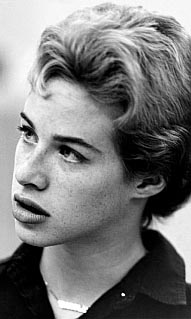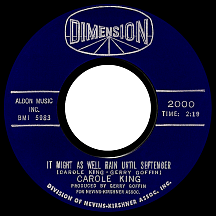CAROLE KING
It Might as Well Rain Until September
Songwriting was Carol Klein's priority from a very early age. So was singing. But did the egg come before the chick or vice-versa? Only she knows for sure. During high school in Brooklyn she sang with a short-lived group called The Co-Sines and by the ripe age of 15 had made it known among the music publishing companies in New York that she was serious about writing songs. Her go-for-it attitude and considerable piano playing skills prompted Don Costa of ABC-Paramount Records to give her a shot. By that time she had changed her name to Carole King (adding the "e" to her first name, inspired by glamorous film actress Carole Lombard, who had died a few weeks before she was born in 1942). Costa produced and arranged the session for two songs she'd written, "The Right Girl," an oddly appealing midtempo teen love song that revealed a considerably flawed vocal style, and its flip, "Goin' Wild," which worked better as a rock and roll effort. Several months passed after its spring 1958 release before a second single, "Baby Sittin'," appeared. This was a far cry from the blues, but her material was borne of the same concept: the songwriter's own personal experience.
As she moved closer to the realization that her singing and songwriting pursuits might have to be executed separately, for a time at least, she met college chemistry major Gerry Goffin. The two penned "Short Mort" as an alternative to Annette Funicello's hit "Tall Paul" and it became Carole's third single, released on RCA Victor in the summer of '59 around the time her unforeseen "accident" (i.e. pregnancy with daughter and future recording artist Louise Goffin) resulted in an August wedding ceremony. So...might as well keep going with the songwriting collaborations! Carole usually wrote the music and Gerry came up with lyrics, though label credits were reversed most of the time (standard practice being to list the music composer first). During that early phase they worked for Don Kirshner at Aldon Music, which had an office on Broadway. Neil Sedaka's December '59 top ten hit "Oh! Carol" was what you might call a thinly-veiled thank-you note to King, who'd dated him at one point. Gerry slapped together an answer song, "Oh, Neil!," which became his bride's fourth single, this time on the independent Alpine label; writer credit went to Howard Greenfield, Sedaka and Goffin, while Gerry's lyrics had an odd hillbilly slant ('Darling when I saw you at the square dance...I had too much molasses...and your lips stuck to mine!') including a "Grandpappy" character ("I told that gal not ta play them dad-gone Neil Sedaky records")!
It was all good fun, yet less copies were sold than were sent out as free promos. Goffin, unsure of his abilities (the great Doc Pomus claimed Gerry sought his advice on how to write songs), couldn't seem to make the teen romance angle work (for others it did, just not the newlyweds!); he needed to figure a way to put the youthful themes in deeper context. "Will You Love Me Tomorrow" (titled "Tomorrow" on first pressings) became the essential stepping-stone to success. Scepter Records group The Shirelles, with a few hits already in the bag, recorded the song, late-night passion scenario intact, in November 1960. Carole arranged the session under producer Luther Dixon. It went to number one in February '61 and suddenly Goffin and King's services were in high demand.
Working across the street from the Aldon office at the Brill Building, where an assembly line of songwriters (including Sedaka and Greenfield, Pomus and Mort Shuman, Barry Mann and Cynthia Weil and dozens of others) created many of the era's most durable songs, Gerry and Carole scored about a half dozen hits in 1961, including "Some Kind of Wonderful" (by The Drifters), "Halfway to Paradise" (Tony Orlando and, in England, Billy Fury), "Every Breath I Take" (Gene Pitney) and a second chart-topper, "Take Good Care of My Baby" by Bobby Vee, confirming their position as one of music's hottest songwriting teams. An unplanned writer-swap took place at the Brill one day, giving Carole her only '60s hit penned without involvement from hubby Gerry; she created "Crying in the Rain" with Greenfield, a big one in '62 for The Everly Brothers. The rest of the year went incredibly well for Goffin and King, as chart hits bearing their names more than doubled the previous year's total. The Paris Sisters ("He Knows I Love Him Too Much"), James Darren ("Her Royal Majesty"), Bobby Rydell ("I've Got Bonnie"), the Drifters ("When My Little Girl is Smiling"), Connie Stevens ("Why'd You Wanna Make Me Cry"), Bobby Vee ("Sharing You") and Gene McDaniels ("Point of No Return") all benefited from their expertise and growing music industry reputation.
Kirshner founded Dimension Records in 1962, kicking things off in style with a number one smash, thanks to Gerry and Carole. 19-year-old Eva Boyd, working as a nanny for their infant daughters, did the lead vocal for "The Loco-Motion," the latest offering for the "twist"-obsessed, dance-crazy public; as Little Eva, the nonprofessional singer hit the top of the pop charts in August. Meanwhile, Phil Spector went off the deep end...again?...with a Crystals 45, "He Hit Me (And it Felt Like a Kiss)," which happened to be a Goffin-King song (the controversial single wasn't a hit...potential damage to reputations averted).
As Dimension became an instant force in the business, Carole decided to give singing another try, doing so with a song that tapped into youthful insecurity similar to the way "Will You Love Me Tomorrow" had done. "It Might As Well Rain Until September" (credited to King-Goffin, suggesting the lyrics were Carole's) reversed the popular "summer romance" theme by making the out-of-school months a time of separation, casting gloom over a normally cheerful season. 'The weather here has been as nice as it can be...although it doesn't really matter much to me...' puts happiness on hold in hopes of a brighter autumn: '...darling while your arms are out of reach...the summer isn't any friend of mine,' a good indication of the kind of increasingly brilliant work the gifted Bronx belle, still just 20 years old, was capable of. It reached the top 30 at the end of summer, her first hit as a singer. Eventually there would be many more.

A second King single on Dimension, "School Bells Are Ringing," features backing vocals by Filipino group The Rocky Fellers (they had their own hit, "Killer Joe," a few months later). Though this and Carole's third Dimension disc, "He's a Bad Boy," failed to build on the "September" breakthrough, two important things were clear: her expertise as a pop songwriter was undeniable and the possibility of a successful singing career, not entirely certain with the early efforts, was now a viable option. Of course, some say a person should have a stable occupation to fall back on...but that "backup" must have been exceedingly obvious shortly after she came within range of the Shirelles. Goffin-King songs were a staple of radio over the next few years; Little Eva scored with "Keep Your Hands Off My Baby" and"Let's Turkey Trot" and Dimension girl group The Cookies enjoyed hits with G&K gems "Chains" and "Don't Say Nothin' Bad (About My Baby)." 1963 was a banner year with Steve Lawrence's chart-topper "Go Away Little Girl" and the Drifters' universally-acclaimed "Up on the Roof" in addition to "This Little Girl" (Dion), "One Fine Day" (The Chiffons), "Hey, Girl" (Freddie Scott), "I Can't Stay Mad at You" (Skeeter Davis) and several other Steve Lawrence and/or Eydie Gorme goodies.
As the 1960s progressed, hits came less frequently (for most of the Brill Building and New York songwriters in general, unfortunately), yet the prolific Goffin and King team had some of their best work still to come: "I'm Into Somethin' Good" (a hit for Cookies lead singer Earl-Jean and Brit band Herman's Hermits) and "Oh No Not My Baby" (Maxine Brown) in '64, "Just Once in My Life" (The Righteous Brothers) in '65, "Don't Bring Me Down" (The Animals) in '66, "Pleasant Valley Sunday" (The Monkees) and, with the help of Jerry Wexler, "(You Make Me Feel Like) A Natural Woman" (Aretha Franklin) in '67. Remakes of earlier hits started kicking in around this time, with The Happenings' version of "Go Away Little Girl," "Will You Love Me Tomorrow" by The 4 Seasons and "Take Good Care of My Baby" by Bobby Vinton.
In 1966, Carole made her first vocal record since '63, a no-punches-pulled breakup song, "A Road to Nowhere" ('Our love it has rotted...right down to the core...'), issued on Carole and Gerry's own Tomorrow label. It would appear there were elements of truth in the song's lyrics, as the couple divorced about two years later. She moved to Los Angeles and performed as part of a short-lived pop-rock trio, The City. In 1970 she signed with Lou Adler's Ode Records; the album Writer and a single of her even-then classic "Up on the Roof" (Goffin was apparently erased from the bio, as writer credit showed only her name) met with much less enthusiasm than anticipated. This wasn't the case with the next collection of recordings. Working with lyricist Toni Stern, a new sometime-songwriting partner, Carole King presented the world with Tapestry in 1971, highlighted by her number one hit "It's Too Late," which launched the superstar phase of her phenomenal career.


